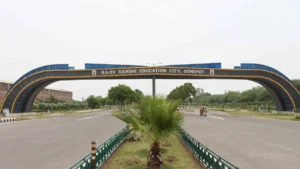Stadiums transcend their roles as mere sports venues; they embody iconic symbols of human achievement and an unwavering passion for athletic pursuits. These arenas serve as the conduits passionate fans and the electrifying atmospheres that come to life during sporting competitors, rendering stadiums deeply meaningful to sports enthusiasts worldwide. Amid the realm of architectural marvels, encapsulating the essence of sports on an enormous scale.
Biggest Stadiums in the World List
Narendra Modi Stadium with the total capacity of 132,000 seating topped the list of biggest stadium in the world, located in Ahmedabad, Gujarat, India.
Here is the list of Top 10 Biggest Stadium in the World:
| S. No. | Name | City/ State | Country | Capacity | Sports |
| 1. | Narendra Modi Stadium | Ahemdabad, Gujarat | India | 132,000 | Cricket |
| 2. | Rungrado 1st of May Stadium | Pyongyang | North Korea | 114,000 | Football, athletics, mass games |
| 3. | Michigan Stadium | Ann Arbor, Michigan | United States | 107,601 | American football |
| 4. | Beaver Stadium | State College, Pennsylvania | United States | 106,572 | American football |
| 5. | Ohio Stadium | Columbus, Ohio | United States | 102,780 | American football |
| 6. | Kyle Field | College Station, Texas | United States | 102,733 | American football |
| 7. | Tiger Stadium | Baton Rouge, Louisiana | United States | 102,321 | American football |
| 8. | Neyland Stadium | Knoxville, Tennessee | United States | 101,915 | American football |
| 9. | Darrell K Royal-Texas Memorial Stadium | Austin, Texas | United States | 100,119 | American football |
| 10. | Bryant-Denny Stadium | Tuscaloosa, Alabama | United States | 100,077 | American football |
1. World’s Biggest Stadium: Narendra Modi Stadium
Capacity: 132,000
Operator: Gujarat Cricket Association
Location: Motera, Ahmedabad, Gujarat
Construction Cost: Rs. 800 crore
Sports: Cricket
Teams: India Nation Cricket Team, India Women’s National Cricket Team, Gujarat Titans, Gujarat Cricket Team
Key points of the World’s biggest stadium, Narendra Modi Stadium:
- The Narendra Modi Stadium, located in Ahmedabad Gujarat, is the biggest cricket stadium in the world.
- Formerly known as Sardar Vallabhbhai Patel Stadium, it was renamed in honor of Prime Minister Narendra Modi in 2021.
- It was constructed in 1983 and was first renovated in 2006.
- Narendra Modi Stadium is a part of the Sardar Vallabhbhai Patel Sports Complex, which includes various sports facilities.
- In Febrauary 2021, the stadium hosted its first international day-night Test match between India and England.
- This stadium is a host to Test, ODI, T20 and Indian Premier League cricket matches.
2. World’s Second Biggest Stadium: Rungrado 1st of May Stadium
Capacity: 114,000
Location: Pyongyang, North Korea
Sports: Football, athletics, mass games
Teams: Korea DPR national football team
Key points of World’s second Biggest stadium in the World, Rungrado 1st of May Stadium:
- Rungrado 1st of May Stadium, also known as Rungrado 1st of May Day Stadium, is the second biggest stadium in the world.
- It has been built over an area of 7 hectares (51 acres).
- The stadium was opened on 1 May 1989, with its first major event being the 13th World festival of Youth and Students.
- The stadium’s roof has 16 arches arranged in a ring that resembles a magnolia blossom.
3. World’s third Biggest Stadium: Michigan Stadium
Capacity: 107,601
Operator: University of Michigan
Location: Ann Arbor, Michigan, United States
Sports: American football
Teams: Michigan Wolverines football
Key points of World’s third Biggest Stadium, Michigan Stadium:
- Michigan Stadium or “The Big House” is the stadium for the University of Michigan in Ann Arbor, Michigan.
- This stadium was built in 1927 at a cost of $950,000 and has an original capacity of 72,000.
- It is the biggest stadium in the United States and the third biggest stadium in the world.
4. Beaver Stadium
Capacity: 106,572
Location: Pennsylvania State University, North America
Operator: Pennsylvania State University
Opened: 17th September, 1960
Sports: American Football
Teams: Penn State Nittany Lions Football
Beaver Stadium opened in 1960 and is mainly used for American Football and serves as the home of the Pennsylvania State University football team. In 2016, people voted it the best football stadium in college football. The stadium has been expanded six times, and in 1976, it could fit 60,203 people. It was the first stadium on Google Street View too.
5. Ohio Stadium
Capacity: 102,780
Location: Columbos, Ohio, North America
Opened: 7th October, 1922
Operator: Ohio State University Department of Athletics
Sports: American Football
Teams: Ohio State Buckeyes Football
The fifth largest stadium is the Ohio Stadium in Columbus. People call it ‘The Horeshoe’ or ‘The Shoe’ because it looks like a horeshoe. It was opened in 1922. The stadium also holds music concerts. The seating capacity has grown over time and reached 102,780.
6. Kyle Field
Capacity: 102,733
Location: College Station, Texas, North America
Opened: 24th September 1927
Sports: American Football
Team: Texas A&M Aggies football
Kyle Field is one of the biggest stadiums in the world, located at Texas A&M University in the United States. It is the world’s biggest non-racing stadium and the largest one in Texas. A guy named Edwin Jackson Kyle, who graduated from Texas A&M in 1899, wanted a place for sports at the school. So, in 1906, the student group “Corps of Cadets” named the field “Kyle Field” to honor him. It is the biggest stadium in the Southeastern Conference, fourth-largest in the NCAA and sixth largest non-racing stadium in the world.
7.Tiger Stadium
Capacity: 102,321
Location: Baton Rouge, Louisiana, North America
Opened: 25th November, 1924
Sports: American Football
Teams: LSU Tigers Football
Tiger Stadium is an outdoor stadium at Louisiana State University in Baton Rouge, Louisiana. The LSU Tigers football team calls it home. It started with 12,000 seats in 1924 and now fits 102,321. It is the third largest in the Southeastern Conference (SEC), sixth in the NCAA and seventh worldwide.
8. Neyland Stadium
Capacity: 101,915
Location: Knoxville, Tennessee, North America
Opened: 24th September, 1921
Operator: University of Tennessee
Sports: American Football
Teams: Tennessee Volunteers football
Neyland Stadium is one of the biggest stadiums in the world. It is home to the Tennessee football team, but also hosts events and NFL exhibition games. The stadium can fit 101,915 people. Built in 1921 as Shield- Watkins Field, it’s gone through 16 expansions. It is the sixth biggest in the US, eighth worldwide and second in the SEC. It is named after Robert Neyland, a coach at the University of Tennassee.
9. Darrell K Royal- Texas Memorial Stadium
Capacity: 100,119
Location: Austin, Texas, North America
Opened: 8th November 1924
Operator: University of Texas at Austin
Sports: American football
Teams: Texas Longhorns football
Darrell K Royal Memorial Stadium, situated in Austin, Texas, at the University of Texas, has been home to the Longhorns football team since 1924. It holds a strong home record. With a seating capacity of 100,119, it is the largest in the Big 12 Conference, seventh in the US and ninth globally.
10. Bryant-Denny Stadium
Capacity: 100,077
Location: Tuscaloosa, Alabama, North America
Opened: 28th September, 1929
Sports: American football
Teams: Alabama Crimson Tide Football
Bryant-Denny Stadium is an outdoor stadium at the University of Alabama in Tuscaloosa. It is the opened in 1929 and named after George H. Denny, the school’s president, it later included coach Paul “Bear” Bryant’s name. With the seating of 100,077, it is the fourth-largest in the SEC, eighth-largest in the US and tenth largest globally.
List of Criteria Notes of World’s Biggest Stadium
The capacity figures provided in this list represent the standard permanent total capacity of stadiums, encompassing both seating and any permanent standing areas. Temporary accommodation is excluded from these figures. It’s important to note that incidental record attendance is not considered relevant; only regular capacity counts. For detailed attendance records, refer to the List of sporting venues with a highest attendance of 100,000 or more.
- Stadiums included in this list have a minimum capacity of 40,000. Excluded from consideration are stadiums that are defunct, closed, or no longer serving as competitive sports venues. Examples of such venues, like Great Strahov Stadium, which once held around 250,000 spectators, can be found in the List of closed stadiums by capacity.
- It’s essential to clarify that race tracks, such as the Indianapolis Motor Speedway and the Tokyo Racecourse, are not considered stadiums and are therefore not included in this list. For a comprehensive list of all sports venues by capacity, refer to the List of sports venues by capacity.
- Capacities provided in this list are sourced whenever possible from the figures stated on the official website of the stadium, its tenants, or a sports event it has hosted. This ensures accuracy and reliability in the capacity data presented.
Find More General Studies News Here




 Which District of Haryana is known as th...
Which District of Haryana is known as th...
 Top-5 Richest Cities in India by GDP 202...
Top-5 Richest Cities in India by GDP 202...
 Which Country is known as the Land of Ch...
Which Country is known as the Land of Ch...








